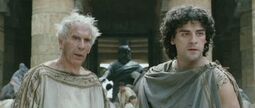in the Library of Alexandria, Christians in black robes are like ignorant worker ants, using expensive trophies-books-inciting a victorious bonfire banquet-crazy, unreasonable Rational farce;
whenever Hypatia stood under the vast starry sky and pondered the relationship between the earth and the sun, what she obtained was a deafening tranquility, only the voice of questioning and thinking from the bottom of her heart - a calm, rational moment.
How to evaluate the grievances that occurred in Alexandria 1700 years ago, the slaughter of polytheists and Christians, the slaughter of Jews by Christians, and the seizure of the administrative power of the Admiral by the Archbishop of Alexandria? You could say they were a rabble, burning books and killing at Cyril's instigation; you could say they were childish, like a child arguing with a knife for an unanswered question; you could say their atrocities were antichrist, and it got worse The solitary religious sectarian disputes will still be staged in the long history that follows: the Knights Templar, the Crusades, the religious persecution in the Middle Ages that lasted for three centuries... Well, these issues are too complicated and will be omitted here. The past is no longer tangled (recently looked at these various past events from Van Loon's "Bible Story" and "Tolerance").
Cone of Apollonius: Daus, Orestes, Sinesius
- Knowledge, Faith and Love, Worthy of
Defending Axes produce many shapes: circle, ellipse, parabola, hyperbola. Just like her three students, Daus, Orestis, and Sinisius, although they went out of the same school, their responsibilities are different, and they are in different positions.
Slave Daus - Christian holy warrior
In the eyes of the hostess Hypatia, his identity is a slave, no matter how smart he is, he still cannot overstep the class. He was skeptical of the Christian gods, but God did grant him his wish—Hypatia didn't accept Orestes' courtship, giving him confidence in his new faith.
When saving the important volumes of the library, the hostess called him "idiot", and Cyril gave him the title of Paladin, and his dignity was immediately improved. Cyril saw that he had doubts about the new mainstream sect, Invite them to join hands to overthrow the statue of the old god. Daus, who had inflated self-esteem, finally had an "equal" relationship with Hypatia, but the forced relationship broke the equivalence of love status, but once again demonstrated the nobility of Hypatia. Hypatia freed his slave status, but he was imprisoned by love and became her prisoner. Until the last moment of Hypatia's life, Daus helped her to leave the world painlessly.
Daus questioned the killing of Jews by Christians. He himself was forgiven by people (attempted rape, Hypatia threw the dagger and let Daus die), but his great God did not tolerate Jews. Other Paladins only said that tolerance is the prerogative of God, and mortals have no right to have it, but can only execute the will of God. During the question-and-answer session, Hypatia's status as a goddess in Daus's mind was consolidated.
For slaves, converting to religion may simply seek shelter and destination for their spiritual and status that they lack in secular society. Converting to religion is nothing but Daus' means to gain identity, status, and self-esteem. The eternal and exclusive religion in his heart is his unconditional love for Hypatia, which he firmly believes and never wavers. The dead are long gone, and the living will suffer the wounds of stealing their souls for the rest of their lives.
Orestis - The most blameless for the Admiral
is Orestis. Ever since he was a student, he has fallen under Hypatia's skirt, been mocked (Hypatia told him to find another music goddess), and publicly humiliated (Hypatia gave him his own menstrual blood in class), but Ori Stis still saved her father for her in distress, and she also covered her when she became an admiral. Cyril forced him to kneel in public to show his sincerity to Jesus, which was also aimed at his submission to Hypatia, and even became the starting point for Cyril to seize power in the future, capturing Orestis' personal weakness in front of everyone's eyes—— Betrayed Jesus for the sake of a polytheistic witch, this chief executive is no more than a little.
The dignified Admiral of Alexandria shed blood and tears for his favorite (the movie did not mention whether he had any other women), and was about to throw his head. The blood red on his forehead and the loud church orders from his comrade Sinesius made him stop there. Orestes succumbed to the church and gave up on Hypatia, who had followed him for most of his life, mainly out of consideration for his personal identity; in fact, when he changed his original belief and served as an admiral as a Christian, he could sense that he had a crush on him. The ambition of his career, women may be a hindrance to his official career, but not the fatal Achilles' heel.
Sinesius - Before Bishop
Sinesius escaped from the Library of Alexandria overnight, he turned back and stroked Hypatia's sleeping face, climbed over the towering library walls to save his life, and reappeared as a bishop who had become an appealing power. He has less ink in the characters. Maybe he lost his love for Hypatia and had enough reason and reason to protect himself.
Hypatia Hypatia
, as an outstanding mathematician, physicist, astronomer and philosopher in ancient Greece, she also has an innate biological attribute, a woman. Her identity as a woman did not prevent her from teaching, researching, and even her father's liberal attitude did not put her under the pressure of marriage, but she was discovered and exploited by political opponents. If she wasn't a woman, just a pure male polytheist, could Cyril find the golden rule in the Bible to condemn her? However, if he wants to add guilt, he is not sure if he is not familiar with the Bible, but it is estimated that Cyril can still find "evidence" for attacking Orestis.
At the Council of Elders, the elders mocked Hypatia for still being superstitious about polytheism, saying that she only believed in philosophy.
Orestes and Sinethius had persuaded Hypatia to convert to Christ to save her life, but she refused on the pretext of "must doubt."
Hypatia was not married to be confined to the duties of those women, and spent her life studying the trajectories of the earth and the sun, gaining peace of mind and abundance in science and knowledge. She once said to Orestes, If I could just unravel this just a little bit more, and just get a little closer to the answer, then... Then I would go to my grave a happy woman. Now she has discovered that the earth revolves around the sun in an elliptical trajectory, and when she hears it, she can die in the evening.
Kant once said that there are two great things, the more often and persistently we think about them, the more our hearts are filled with ever fresh and ever-increasing admiration and awe, the bright starry sky above us, and The moral law of the heart! 1300 years ago from Kant, there was a woman who had a relationship with him.
View more about Agora reviews











